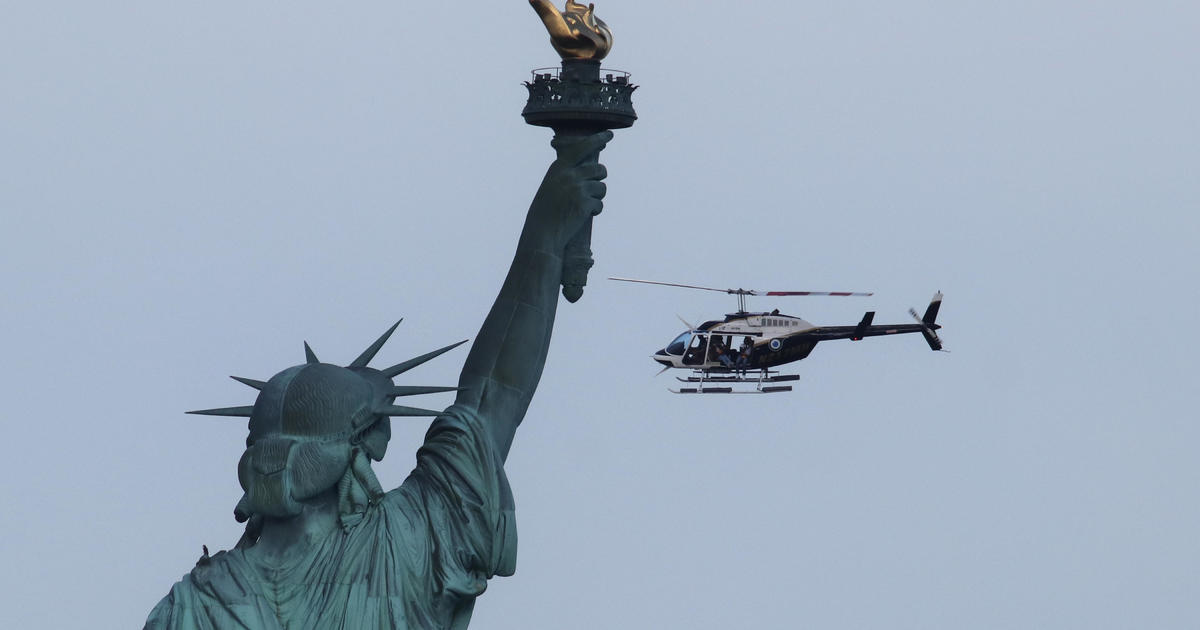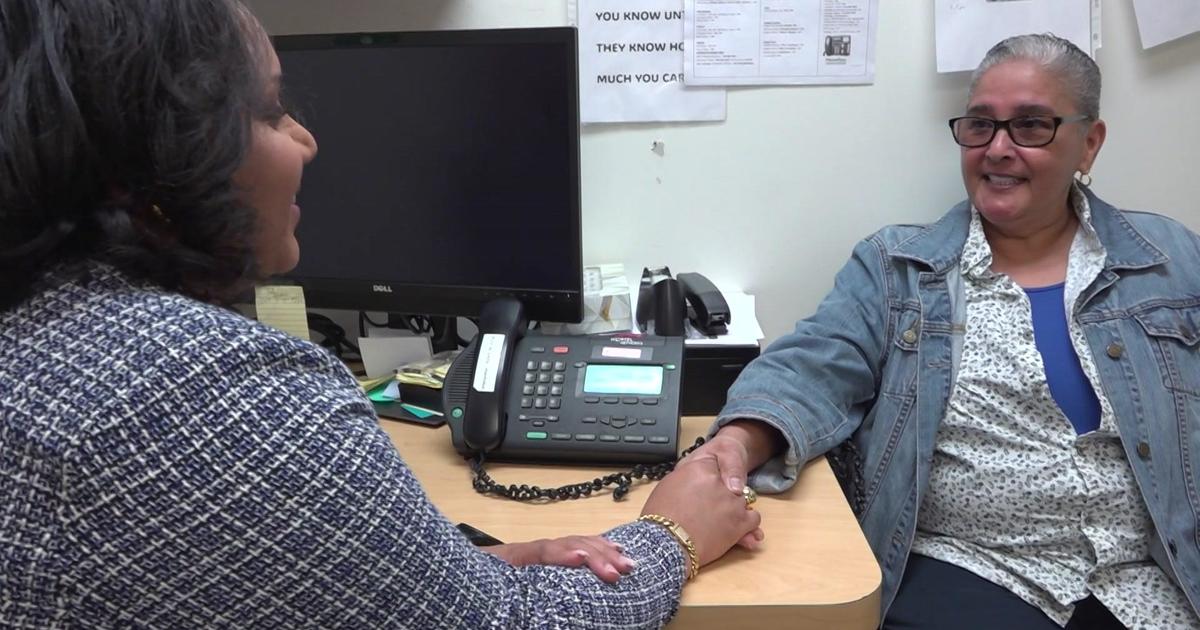Health Officials: NYC Ready If Ebola Reaches City
NEW YORK (CBSNewYork/AP) -- Local health officials said Wednesday that if there's ever a confirmed case of Ebola in New York, they're prepared.
As CBS 2's Elise Finch reported, rooms at Bellevue Hospital Center were being prepped Wednesday to handle patients with the potentially deadly illness, and information posters have been sent to emergency rooms across New York City.
City Health Commissioner Dr. Mary Bassett said those measures, in addition to several others, will ensure that the city's health care community knows exactly what to do if they come across a person who might be infected.
Health Officials: NYC Ready If Ebola Reaches City
"It's identifying the case, isolating the case, evaluating the case, establishing the diagnosis and then getting the person into safe and effective care, then tracking down all of the people with whom they may have had contact," Bassett said.
As CBS 2's Hazel Sanchez reported, Bellevue Hospital officials do not expect an epidemic of the Ebola virus in the U.S.
WEB EXTRA: Got questions about Ebola? Click here for comprehensive information from the CDC
"The chances of this spreading in this country are almost zero, because it can be so easily managed by standard precautions," said Ross Wilson of Bellevue Hospital.
Still, the hospital has set up a system to keep the virus from spreading.
"Every single aspect of care has to be careful to protect -- making sure firstly that the patient gets the right care, but secondly that staff of the facility, family or visitors are not exposed to any risk," Wilson said.
On Tuesday, the U.S. Centers for Disease Control and Prevention announced that a man in Dallas, who had been in Liberia, has become the first person diagnosed with Ebola in the United States.
Dr. Irwin Redlener, director of the National Center for Disaster Preparedness at Columbia University, admitted that keeping Ebola patients out of the U.S. is very difficult, even if travelers are checked.
"The problem is that during the incubation period, you may have zero symptoms and no fever," he told WCBS 880's Peter Haskell.
Redlener said he wouldn't be surprised to see Ebola cases in New York. But, he said, "I am not in the slightest bit worried about a rampant epidemic of Ebola."
That's because hospitals here are on the lookout and know how to isolate infected patients, he said.
Dr. Rossi Hassad, an epidemiologist and professor at Mercy College, told Finch that a person with Ebola is only contagious when he or she is experiencing active symptoms.
"If you have someone who is infected, any body fluids or secretions that you come in contact with is potentially infectious," he said. "Blood, saliva, sweat, fecal matter."
Hassad said Ebola is not an airborne virus, but it can live more than two hours on surfaces such as airline tray tables or armrests.
Airline travelers told Finch they're alarmed because there is no vaccine or cure.
"I think it's pretty scary," Lyonel Reneau, of Harlem, said. "It just makes me a little more hesitant, a little more cautious."
"I'm just very cautious about washing my hands and what I'm touching, and I carry wipes with me," airline passenger Elizabeth Dobrin said.
Still, others say they aren't worried at all because the odds are in their favor.
"At this point, with one case out of 320 million people, I'm not concerned," Joseph Kavalan, another airline passenger, said.
Hassad said most people will never encounter a person with an active case of Ebola in the United States. But anyone who is flying and concerned can wipe down a surface -- a solution of at least 70 percent alcohol will kill the Ebola virus.
Since August, the New York City Health Department has received more than 80 calls about suspected cases of Ebola. Most of those patients were eventually diagnosed with malaria, and none tested positive for Ebola.
On Wednesday, Texas Health Presbyterian Hospital acknowledged that the Ebola patient there, Thomas Eric Duncan, initially went to the emergency room last week but was sent home, even after telling a nurse that he had been in disease-ravaged West Africa.
The decision by the hospital to release him could have put many others at risk of exposure to the disease before he went back to the ER two days later, after his condition worsened.
Duncan explained to a nurse Friday that he was visiting the U.S. from Liberia, but that information was not widely shared, said Dr. Mark Lester, who works for the hospital's parent company.
"Regretfully, that information was not fully communicated throughout the full team, and as a result, the full of import of that information wasn't factored into the clinical decision-making," Lester said.
Instead, the patient was sent home with antibiotics, according to his sister, Mai Wureh, who identified her brother as the infected man in an interview with The Associated Press.
A day after the man's diagnosis was confirmed, a nine-member team of federal health officials was tracking anyone who had close contact with him.
The team from the CDC was in Dallas to work with local and state health agencies to ensure that those people are watched every day for 21 days.
"If anyone develops fever, we'll immediately isolate them to stop the chain of transmission," Dr. Tom Frieden, the CDC director, said in an interview.
Duncan has been kept in isolation at the hospital since Sunday. He was listed in serious but stable condition.
Ebola is believed to have sickened more than 6,500 people in West Africa, and more than 3,000 deaths have been linked to the disease, according to the World Health Organization.
Officials are monitoring 12 to 18 people who may have been exposed to the man, including three members of the ambulance crew that transported him to the hospital and five schoolchildren.
Some of the people are members of his family, but not all, Dallas city spokeswoman Sana Syed said.
The ambulance crew tested negative for the virus and was restricted to home while their conditions are observed. The children, who attend four separate schools, apparently had contact with the man over the weekend and then returned to classes this week. But school officials have said they showed no symptoms.
Ebola symptoms can include fever, muscle pain, vomiting and bleeding, and can appear as long as 21 days after exposure to the virus.
Officials said there are no other suspected cases in Texas.
The man left Liberia on Sept. 19, arrived the next day to visit relatives and started feeling ill four or five days later, Frieden said.
Frieden said he did not believe anyone on the same flights as the patient was at risk.
Four American aid workers who became infected in West Africa have been flown back to the U.S. for treatment after they became sick. They were treated in special isolation facilities at hospitals in Atlanta and Nebraska. Three have recovered.
A U.S. doctor exposed to the virus in Sierra Leone is under observation in a similar facility at the National Institutes of Health.
The U.S. has only four such isolation units, but Frieden said there was no need to move the latest patient because virtually any hospital can provide the proper care and infection control.
Passengers leaving Liberia pass through rigorous screening, the country's airport authority said Wednesday. But those checks are no guarantee that an infected person won't get through and airport officials would be unlikely to stop someone not showing symptoms, according to Binyah Kesselly, chairman of the Liberia Airport Authority's board of directors.
Liberia is one of the three hardest-hit countries in the epidemic, along with Sierra Leone and Guinea.
You May Also Be Interested In These Stories
(TM and © Copyright 2014 CBS Radio Inc. and its relevant subsidiaries. CBS RADIO and EYE Logo TM and Copyright 2014 CBS Broadcasting Inc. Used under license. All Rights Reserved. This material may not be published, broadcast, rewritten, or redistributed. The Associated Press contributed to this report.)



